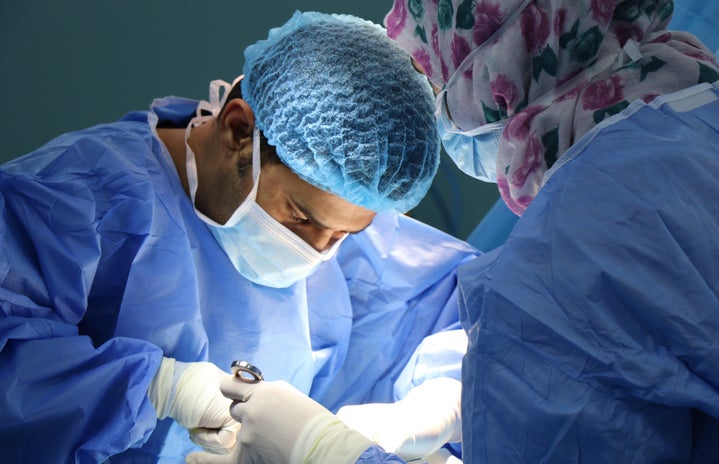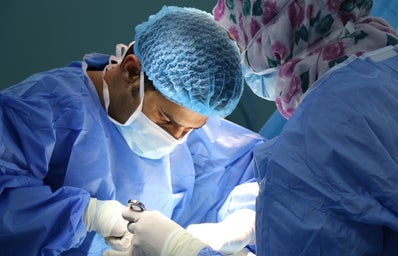In September 2019, a few days after my 18th birthday, I went to my annual wellness visit. I mentioned to my pediatrician that I was having some hearing difficulties. She looked at my ears and recommended that I see an Ear Nose Throat (ENT) doctor. I also had an ear infection that I had no idea existed. Two months later, I underwent ear surgery to remove cholesteatoma in my right ear.
According to the National Center for Advancing Translational Sciences (NIH), “Cholesteatoma is an abnormal growth of skin in the middle ear behind the eardrum.” In my case, it was likely caused by chronic ear infections, though it can be present from birth. I spent a lot of my summers going swimming and getting swimmer’s ear, an ear infection caused from the chlorine in the pool water. I assumed it was just because I was swimming a lot, but there was clearly something else going on.
My ENT doctor told me the procedure would take about 3 hours due to the size of the cholesteatoma. He said that the healing process would be quick and that I would not have to miss a lot of school.
Needless to say, the recovery process was much harder than I thought. I was feeling extremely uncomfortable and in frequent pain. I had some doctor’s appointments afterwards to clean a part of my inner ear that were especially painful. After a couple weeks, I was completely healed. Although my hearing wasn’t 100% perfect, it was noticeably better than what it had been before my surgery.
For a couple years, I was doing alright. I had a couple of ear infections, but they were my own fault. I loved swimming and kept dunking my head underwater, causing me to get swimmer’s ear. It hurt and was annoying, but I kept using the ear drops prescribed to me by various urgent care doctors.
August 2021, the day before I left home to start my sophomore year at Loyola, I went to my ENT doctor for a checkup. Even after being removed by surgery, they can still grow back over the years. He found cholesteatoma again, this time in my left ear. I was devastated to hear this. I was supposed to be thinking about starting my classes, not about the pain I had endured two years ago that made me feel terrible about myself.
My parents and I made plans for me to return to my hometown near Philadelphia that aligned with Loyola’s Fall Semester break. This way, I would only miss three days of classes instead of four. I made the necessary arrangements to get excused from my classes. I also registered with Disability Support Services at Loyola. My doctor recommended that I get some sort of listening device or hearing aid for when I was recovering. My hearing in my left ear is significantly better than my right ear, and I knew that my left ear would be covered by cotton balls or something to help keep the inner ear clean.
The surgery for the left ear was not as bad as the previous one. The cholesteatoma was much smaller, and the surgery was less evasive. This time, I was not in as much pain, but because I had less covering for my ear, I bled a lot more. At one point, I had a menstrual pad over my ear, held in place by a knit cap, to soak up the blood that was leaking through the minuscule cotton ball over my ear. It was not a pleasant experience, but at least I wasn’t getting sick like I was last time.
I am currently fully recovered from my surgery and am in the process of getting a hearing aid for my right ear. My hearing is significantly better than it was before, but I am still dealing with mild to moderate hearing loss. That can be especially difficult in classes and in public settings, but I am lucky enough to usually be able to hear about 95% of what is being said. I see my ear doctor every 3-6 months now and get my hearing checked at those appointments. Hopefully, nothing too drastic will change in the near future.
But even if something does change, I will be prepared to handle it. The first time I got surgery, I felt like a burden to others. I did not have a lot of friends and I felt bad for putting my family through this. I know that none of it was my fault and that my feelings were completely valid, but it didn’t make me feel much better. The fact that I knew nothing about what was going on and that I knew no one who had had a similar experience made me feel isolated and upset.
The second time was much better. I had gone through a year of college by then and had made some friends. I was expecting the whole experience to be just as bad as the first time, and though the surgery recovery was not as bad, the hearing aid took some getting used to. It was hard to navigate on my own, but I managed with the support of my friends and family. I know now that if I ever need to get any kind of surgery, I will have plenty of support from friends and family. I will be able to handle it physically and mentally. I will be alright.


